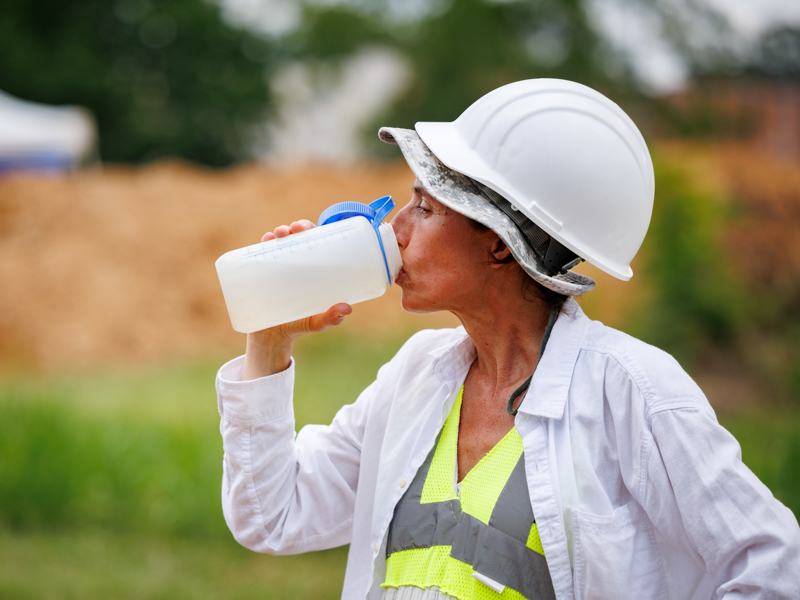How to stay safe this summer as record-breaking heat continues
Published on Monday, July 1, 2024
By: Rachel Vanderford, rvanderford@umc.edu
Photos By: Joe Ellis/ UMMC Communications
In 2023, we experienced the hottest year on record, and now, halfway through 2024, there’s a strong possibility of another record-breaking year. Last month marked the 12th consecutive month of record-warm temperatures, the second longest streak in recorded history.
As extreme heat advisories begin taking effect for the summer months, it’s crucial to understand the importance of heat safety and take proactive measures to protect yourself and others. Extreme heat often results in the highest number of deaths among all weather-related disasters each year.
In extremely humid areas like Mississippi, it’s especially important to pay attention to the heat index, which describes what temperatures feel like to the human body. High humidity levels increase the heat index by reducing the body’s ability to cool itself through sweating, making it feel hotter than the actual air temperature.
Heat-related illnesses, such as heat exhaustion and heat stroke, can occur when the body is unable to cool itself adequately and can cause permanent damage if not promptly treated.
Plan ahead
Be sure to pay attention to the heat index and heat advisories in your area and be prepared for heat-related emergencies.

“Number one: make sure you have access to clean drinking water,” said Carl Mangum, associate professor of nursing and emergency preparedness and response specialist. “Also, make sure you have access to some type of cooling, whether that’sa fan or air conditioning. If your home is not air conditioned and the temperature gets to well over 100 degrees, especially if the heat index is in the 110s, consider a plan to go to a family member or friend’s home.”
Try to stay inside if possible. Don’t plan to do things like cut grass at noon Mangum said. “If you’re doing anything outside, it needs to be either very early in the morning or late in the evening if you have to do it,” he said. “If it’s not a must, it’s best just to wait until things cool back off again.”
You should also check in on family members, friends or neighbors who are elderly or suffer from medical conditions such as high blood pressure or diabetes as they are more vulnerable to high heat emergencies.

Stay safe
If you are working outside during extreme heat conditions, take precautions to stay safe and avoid heat-related injuries or illnesses.
- Wear light, loose-fitted clothing – This will help keep you cool by allowing better air circulation and aiding in the evaporation of sweat.
- Seek shaded areas or wear a wide-brimmed hat to protect your face from the sun.
- Take regular breaks – Avoid over-exerting yourself by taking intermittent breaks in the shade, preferably in an air-conditioned space.
- Drink plenty of fluids – When you are dehydrated, your body retains more heat. Staying hydrated helps your body sweat.
- Avoid strenuous activity – If it’s necessary, try to complete fatiguing tasks in the early morning or evening to avoid the peak heat of the day.
- Avoid alcoholic and caffeinated beverages – Alcohol and caffeine are diuretics, which increase the loss of fluids from your body.
- Do NOT leave people or pets in a closed car- According to the National Safety Council, 37 children on average under the age of 15 die each year from heatstroke after being left in a vehicle each year.
Know the signs
Before experiencing heat exhaustion or heat stroke, one might suffer from heat cramps, which are painful muscle spasms caused by excessive sweating and loss of electrolytes.
“When young men and women are out playing sports in the summer, a lot of times they’ll cramp up in their large muscles because of the loss of water and electrolytes through sweat,” said Mangum. “Most of the time, if they just sit down and rehydrate, maybe get a small snack, they’re usually better within an hour or so.”
Heat exhaustion is a form of heat-related illness that can develop after exposure to high temperatures and inadequate hydration. The most common warning signs include heavy sweating, paleness, muscle cramps, tiredness, weakness, dizziness, headache, nausea or vomiting and fainting. The key indicators that someone is experiencing heat exhaustion, rather than heat stroke, are cool and moist skin, a fast and weak pulse, and rapid, shallow breathing.
“Heat exhaustion is an emergent situation,” Mangum said. “It may not be a 911 emergency, but it still demands immediate attention, or it may progress quickly to a medical emergency.”
If you or someone you know is suffering from heat exhaustion, the top priority is to move to a cooler environment—ideally indoors—and rest for 30 minutes to an hour. The victim should drink cool water, take a cool bath or shower, and change into light weight clothing. If symptoms are severe or the individual has heart problems or high blood pressure, seek medical attention immediately. If left untreated, heat exhaustion may progress to heat stroke.
Heat stroke occurs when the body’s temperature rises rapidly, the sweating mechanism has failed and the body is unable to cool down. Signs to watch out for include rapid, strong pulse; throbbing headache; dizziness; nausea; confusion and unconsciousness. The victim’s skin will be hot to the touch, as their temperature may rise to 106 degrees or higher within 10 to 15 minutes.

“If it involves elevated body temperature of upward of 104 degrees, nausea, vomiting, worsening cramping and altered mental status,” Dr. Trey Wofford, medical director of the Adult Emergency Department, said in a 2023 report. “They may have dizziness that would cause them to pass out.”
In cases of heat stroke, seek medical attention immediately. While awaiting emergency personnel, remove the affected from the heat and attempt to lower the body temperature by immersing or spraying with cool water and monitor temperature until it drops to 101 to 102 degrees.
Sometimes a victim’s muscles will begin to twitch uncontrollably. If this happens, keep the victim from injuring themselves but do not place any object in the mouth and do not give fluids. If they are vomiting, make sure the airway remains open by turning them on their side. Heat stroke can cause death or permanent disability if emergency treatment is not provided.
“These illnesses are entirely preventable,” said Mangum. “Think ahead. Watch for the warnings on the news. Stay indoors and keep yourself safe. Check on your friends, family and the elderly. Make sure everyone has water and air conditioning.”